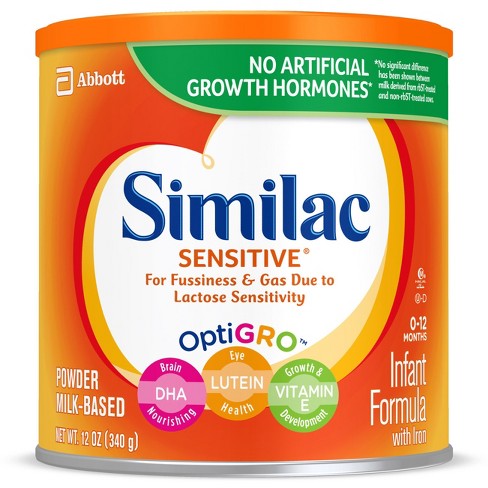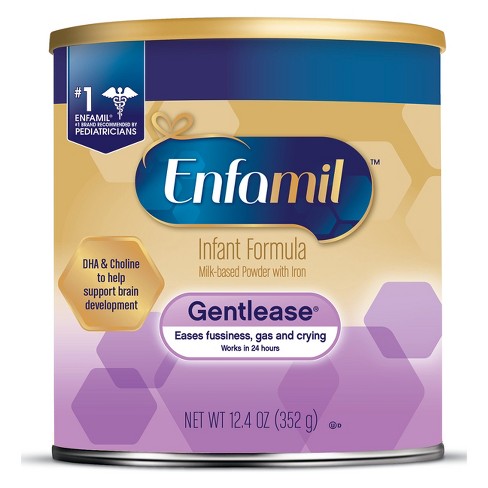Gassy babies tend to be fussy babies, as those who have dealt with indigestion and colic know all too well.
Parents suffer from sleepless nights and stressed-out days, worrying about how they can relieve their baby’s pain.
Switching formulas can help ease the gas, vomiting, and intense burping.
There are plenty of sensitive stomach formulas out there, but two really stand out.
In the battle of Similac Sensitive vs Enfamil Gentlease, which one comes out on top as best for babies developing digestive systems?
Let’s find out.
What are the biggest differences, and why do they matter?
Chances are you’ve run the gauntlet of trying different things to ease your baby’s gas:
gas relief drops, the famous ‘football’ hold, burping your baby more frequently, and, of course, changing their formula.
Sometimes, it seems like none of that really works.
Wondering why that’s the case?
If your baby has gastrointestinal reflux (GER) or gastrointestinal reflux disorder (GERD), they could benefit from something without lactose.
Cow’s milk can cause a lot of agitation in a baby’s developing GI tract, causing reflux.
Similac Sensitive is different from Enfamil Gentlease in that it is lactose-free.
Enfamil Gentlease, on the other hand, utilizes gentle proteins.
The package lists partially hydrolyzed nonfat milk and whey protein concentrate solids as ingredients in the formula.
Similac Sensitive lists milk protein isolate as a source of protein.
In other words, Gentlease still has some lactose in it; it’s just reduced from what you get in other formulas.
Some babies seem to do just fine on Gentlease while others do better on Similac Sensitive.
Nutrition Information
Nutrients per 100 Calories ~ (5 fl oz)
| - | Similac Sensitive | Enfamil Gentlease |
|---|---|---|
| Protein | 2.1 g | 2.3 g |
| Fat | 5.4 g | 5.3 g |
| Carbohydrate | 11.1 g | 10.8 |
| Water | 140 g | 133 g |
| Linoleic Acid | 1000 mg | 800 mg |
| Vitamin A | 300 IU | 300 IU |
| Vitamin D | 60 IU | 60 IU |
| Vitamin E | 1.5 IU | 2 IU |
| Vitamin K | 8 mcg | 9 mcg |
| Thiamin (Vitamin B1) | 100 mcg | 80 mcg |
| Riboflavin (Vitamin B2) | 160 mcg | 140 mcg |
| Vitamin B6 | 63 mcg | 60 mcg |
| Vitamin B12 | 0.26 mcg | 0.3 mcg |
| Niacin | 1100 mcg | 1000 mcg |
| Folic Acid (Folacin) | 16 mcg | 16 mcg |
| Pantothenic Acid | 470 mcg | 500 mcg |
| Biotin | 4.6 mcg | 3 mcg |
| Vitamin C (Ascorbic Acid) | 9 mg | 12 mg |
| Choline | 24 mg | 24 mg |
| Inositol | 4.5 mg | 6 mg |
| Calcium | 88 mg | 82 mg |
| Phosphorus | 59 mg | 46 mg |
| Magnesium | 6 mg | 8 mg |
| Iron | 1.9 mg | 1.8 mg |
| Zinc | 0.79 mg | 1 mg |
| Manganese | 5 mcg | 15 mcg |
| Copper | 95 mcg | 75 mcg |
| Iodine | 9 mcg | 15 mcg |
| Selenium | 2 mcg | 2.8 mcg |
| Sodium | 32 mg | 36 mg |
| Potassium | 110 mq | 108 mg |
| Chloride | 68 mq | 63 mg |
Similac Sensitive Vs Enfamil Gentlease Reviews
Subduing Gassy Tummies with Similac Sensitive

Target
In the debate between Similac Sensitive vs Enfamil Gentlease, Similac Sensitive is the one that pediatric doctors and nurses tend to highly recommend.
Why is this?
Similac Sensitive is completely lactose-free.
Babies can be lactose intolerant, and this is based on how the enzyme lactase (which breaks down lactose) functions.
If it can’t absorb and digest the sugar found in dairy and milk products, it leads to fermentation in the gut, which triggers an array of unpleasant symptoms.
For some babies, even a little bit of lactose can cause gas, spit-up, and painful digestion.
Reduced lactose formulas can still trigger these symptoms.
Similac Sensitive, however, seems to be effective for reducing signs of lactose intolerance in many babies.
Similac Sensitive is also nutrient-dense.
In a 100-calorie serving (5.3 fluid ounces), your baby gets 2.1 grams of protein
1000 grams of linoleic acid (an essential fatty acid that we humans need to grow and thrive)
5.4 grams of fat
and 140 grams of water.
Your baby also receives a good mix of vitamins and minerals needed for all forms of development.
The list of vitamins and minerals includes:
| Vitamin A | 300 IU |
| Vitamin D | 60 IU |
| Vitamin E | 1.5 IU |
| Vitamin C | 9 mg |
| Calcium | 88 mg |
| Magnesium | 6 mg |
| Potassium | 110 mg |
| Sodium | 32 mg |
All together, these ingredients are what your baby needs to help them develop.
The formula consists of what Similac calls OptiGRO. This is a blend of DHA, lutein, and vitamin E.
Together, these three ingredients provide many growth benefits.
Lutein, for example, is known for its ability to stimulate growth in brain cells.
It also boosts eye health, as lutein is found in high concentrations in the macula and is the main carotenoid found in the infant’s brain.
DHA also supports neurological development.
However, it is prone to harm caused by oxidation… except when it is paired with lutein and vitamin E.
Studies show that vitamin E and lutein act as a buffer against potential damage via oxidation.
DHA is found in a lot of formulas, but not in combination with lutein and vitamin E as protectors.
Aside from being lactose-free, that’s one of the biggest reasons why parents and pediatricians alike are choosing Similac Sensitive.
Enfamil Gentlease: Like Mother’s Milk

Target
Enfamil Gentlease has a few pretty significant differences from Similac Sensitive.
As already stated, it does have a reduced amount of lactose, whereas Similac Sensitive has none.
This might be the most profound differentiation
but there are other things that you should know about Enfamil Gentlease.
This particular formula utilizes milk fat globule membrane (MFGM), a bioactive membrane found in breast milk.
MFGM is known for aiding in the development of babies brain structures.
In Enfamil’s products, it is part of what the company calls NeuroPro – a combination of MFGM and DHA.
NeuroPro also includes prebiotics for your baby’s immune system.
Prebiotics (and probiotics) are considered “good” bacteria.
They help to balance out gut flora.
Therefore, having them in your baby’s formula can aid in your baby’s gastrointestinal development.
This can help keep your baby’s gas to a minimum without making them constipated.
Gentlease comes as either NeuroPro or PREMIUM.
PREMIUM is a non-GMO formula with DHA and Inositol.
The only thing that differentiates it from NeuroPro is that it does not have MFGM.
While we’re at it, let’s take a more detailed look at what is slapped onto the ingredients label.
Here is what you will find (listed per serving) if you pick up PREMIUM:
| Protein | 2.3 g |
| Fat | 5.3 g |
| Carbohydrates | 10.8 g |
| Water | 133 g |
| Linoleic Acid | 800 mg |
| Vitamin A | 300 IU |
| Vitamin E | 2 IU |
| Vitamin D | 60 IU |
| Vitamin K | 9 mcg |
| Choline | 24 mg |
| Calcium | 82 mg |
| Iron | 1.8 mg |
| Zinc | 1 mg |
Overall, it seems that Enfamil Gentlease has the most similarities to breast milk.
For moms who breastfeed but want to curb their baby’s gas, Gentlease can be a good addition to their daily intake.
Which formula is right for your baby?
In the debate of Similac Sensitive vs Enfamil Gentlease, there is no clear winner.
These two products both have their advantages for helping to alleviate gas and spit-up.
The determining factor for purchase is likely going to be whether your baby is lactose-intolerant or if they can handle some lactose.
Both products offer their own blend of ingredients that are supposed to enhance neurological development and offer immune system support.
Gentlease does have the bonus of MFGM making it more like human breast milk, but this means your baby will ingest some lactose.
If your baby cannot tolerate any lactose, Similac Sensitive is worth a try.
Many parents have seen a major reduction – if not outright elimination – of their babies symptoms after starting them on Similac Sensitive.
Essentially, the choice of whether to use Similac Sensitive or Enfamil Gentlease rests with you, the parent.
Of course, it is always a good idea to consult your child’s pediatrician before switching formulas.
The pediatrician can give you more insight into your baby’s unique needs and make suggestions that go beyond a formula change.
Never fear, parents of fussy, colic-y babies!
There is hope for you to get a good night’s sleep and your baby to feel better.
Each of these formulas can provide relief for both your baby and you.
Additional information:
- How to Figure Out When to Change Nipple Flow On Bottles?
- These 3 Bottles is Getting More Popular Because of This Anti-Colic System
- Constipation or Gas? Here is The Similac Alimentum Side Effects
- Similac Sensitive
- Enfamil Gentlease
- The Best Remedies for Gas & Reflux
- Lactose intolerance
- OPTIGRO: BENEFITS BEYOND DHA ALONE
- What is MFGM and What Does it Do?
- Which Avent’s nipple size your baby needs?
Photo credits: Target.
